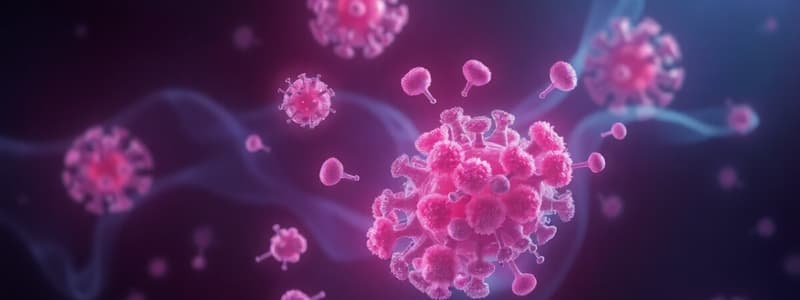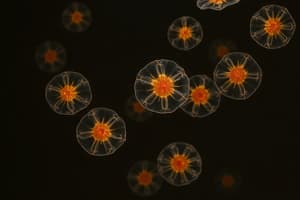Podcast
Questions and Answers
What is the role of helper T cells in the activation of B cells?
What is the role of helper T cells in the activation of B cells?
- They directly activate B cells by releasing cytokines.
- They directly activate B cells by binding to their MHC class II molecules.
- They phagocytize and process antigens to present them to B cells.
- They provide confirmation to B cells, leading to their activation and differentiation. (correct)
Which of the following describes the process of antigen presentation by B cells?
Which of the following describes the process of antigen presentation by B cells?
- B cells internalize the antigen, break it down, and display fragments on MHC class I molecules.
- B cells present intact antigens on their surface for recognition by T cells.
- B cells internalize the antigen, break it down, and display fragments on MHC class II molecules. (correct)
- B cells do not present antigens, they only recognize and bind to them.
What is the function of the T-cell receptor (TCR)?
What is the function of the T-cell receptor (TCR)?
- It binds to the antigen on the B cell's surface.
- It recognizes and binds to specific peptide fragments presented by MHC class II molecules. (correct)
- It activates B cells by releasing cytokines.
- It binds to the MHC class II molecules on the B cell's surface.
How does the antigen binding to a B-cell receptor lead to the activation of a B cell?
How does the antigen binding to a B-cell receptor lead to the activation of a B cell?
What is the difference between primary and secondary immune responses?
What is the difference between primary and secondary immune responses?
Which of the following is NOT a direct consequence of antigen binding to a B-cell receptor?
Which of the following is NOT a direct consequence of antigen binding to a B-cell receptor?
Which of the following cells are responsible for phagocytizing and processing antigens?
Which of the following cells are responsible for phagocytizing and processing antigens?
How do cytotoxic T cells contribute to the immune response?
How do cytotoxic T cells contribute to the immune response?
What is the essential function of macrophages in the immune response?
What is the essential function of macrophages in the immune response?
What is the outcome of a B-cell encountering an antigen that it is unresponsive to?
What is the outcome of a B-cell encountering an antigen that it is unresponsive to?
What is the significance of the MHC (Major Histocompatibility Complex) in the context of the immune response?
What is the significance of the MHC (Major Histocompatibility Complex) in the context of the immune response?
What is the core function of B-cell activation?
What is the core function of B-cell activation?
What is "affinity maturation" in the context of B-cell activation?
What is "affinity maturation" in the context of B-cell activation?
What is the main function of "class switching" in the context of B-cell activation?
What is the main function of "class switching" in the context of B-cell activation?
What is the implication of B-cells exhibiting a higher binding affinity for an antigen during activation?
What is the implication of B-cells exhibiting a higher binding affinity for an antigen during activation?
Why is the mechanism of B-cell unresponsiveness to self-antigens crucial for maintaining health?
Why is the mechanism of B-cell unresponsiveness to self-antigens crucial for maintaining health?
What is the primary function of dendritic cells in the immune response?
What is the primary function of dendritic cells in the immune response?
In which location do dendritic cells mature and acquire the ability to present antigens to naive T cells?
In which location do dendritic cells mature and acquire the ability to present antigens to naive T cells?
What is the role of IL-2 in T cell activation?
What is the role of IL-2 in T cell activation?
How do cytotoxic T cells (Tc cells) induce apoptosis in infected cells?
How do cytotoxic T cells (Tc cells) induce apoptosis in infected cells?
Which type of MHC molecule is recognized by cytotoxic T cells?
Which type of MHC molecule is recognized by cytotoxic T cells?
What is the primary role of helper T cells (TH cells) in the immune response?
What is the primary role of helper T cells (TH cells) in the immune response?
What type of cells express MHC class II molecules?
What type of cells express MHC class II molecules?
How do TH cells activate B cells?
How do TH cells activate B cells?
What is the role of TH cells in macrophage activation?
What is the role of TH cells in macrophage activation?
What is the primary function of the thymus in T cell development?
What is the primary function of the thymus in T cell development?
What is the main difference between the functions of Tc cells and TH cells?
What is the main difference between the functions of Tc cells and TH cells?
Which of the following is NOT a function of cytokines?
Which of the following is NOT a function of cytokines?
Which of the following is a characteristic of T cell activation?
Which of the following is a characteristic of T cell activation?
What is the role of class switching in B cell activation?
What is the role of class switching in B cell activation?
What is the primary function of B memory cells?
What is the primary function of B memory cells?
Which of the following is NOT a cell type that can produce cytokines?
Which of the following is NOT a cell type that can produce cytokines?
Flashcards
B Lymphocytes
B Lymphocytes
A type of white blood cell that produces antibodies.
Antibody Response
Antibody Response
The process by which B lymphocytes produce antibodies after activation.
B cell Activation
B cell Activation
The process where B cells become ready to produce antibodies, requiring antigen binding and helper T cells.
Antigen Presentation
Antigen Presentation
Signup and view all the flashcards
Helper T Cells
Helper T Cells
Signup and view all the flashcards
Primary Response
Primary Response
Signup and view all the flashcards
Secondary Response
Secondary Response
Signup and view all the flashcards
T-cell Receptor
T-cell Receptor
Signup and view all the flashcards
Antigen-presenting cells (APC)
Antigen-presenting cells (APC)
Signup and view all the flashcards
Tolerance
Tolerance
Signup and view all the flashcards
MHC
MHC
Signup and view all the flashcards
Class switching
Class switching
Signup and view all the flashcards
Affinity maturation
Affinity maturation
Signup and view all the flashcards
Proliferation
Proliferation
Signup and view all the flashcards
IgM and IgG
IgM and IgG
Signup and view all the flashcards
Immature dendritic cells
Immature dendritic cells
Signup and view all the flashcards
Mature dendritic cells
Mature dendritic cells
Signup and view all the flashcards
Activation of T cells
Activation of T cells
Signup and view all the flashcards
Tc (CD8) cells function
Tc (CD8) cells function
Signup and view all the flashcards
MHC class I molecules
MHC class I molecules
Signup and view all the flashcards
Cytokines in immunity
Cytokines in immunity
Signup and view all the flashcards
TH (CD4) cells function
TH (CD4) cells function
Signup and view all the flashcards
APC and MHC class II
APC and MHC class II
Signup and view all the flashcards
Macrophage activation
Macrophage activation
Signup and view all the flashcards
Lymphocyte development
Lymphocyte development
Signup and view all the flashcards
Naïve T cells
Naïve T cells
Signup and view all the flashcards
Cytotoxic functions
Cytotoxic functions
Signup and view all the flashcards
Helper role of TH cells
Helper role of TH cells
Signup and view all the flashcards
Peptide loading
Peptide loading
Signup and view all the flashcards
Study Notes
B Lymphocyte and Antibody Response
- Antigens bind to B cell receptors, triggering B cell response
- Often, helper T cells (TH cells) are needed for B cell activation
- Activated B cells divide and differentiate to produce antibodies
- Antigens enter the body, are engulfed by macrophages, and processed
- Macrophages present a portion of the antigen on their surface, acting as antigen-presenting cells (APCs)
B-Cell Activation
- Antigen binds to a B cell receptor
- B cell internalizes the antigen
- Antigen is broken down into peptide fragments
- Fragments are presented on the B cell surface via MHC class II molecules
- Helper T cells (TH cells) recognize the presented fragments
- Cytokines are released, initiating B cell proliferation
- If no recognition, B cell remains unresponsive with tolerance to the antigen
Characteristics of Activated B Cells
- Enhanced immune response - including affinity maturation
- Class switching: initial IgM secretion, then other antibody classes (e.g., IgG)
- Memory cell formation: some B cells become long-lived memory cells, allowing a faster secondary response upon re-exposure to the antigen
Characteristics of Primary Response
- Lag period (10-14 days): antibody detection in the blood is slow and low
- The immune system is actively responding with initial B cell activation
- Antibody concentration (titer) increases slowly
- IgM is initially produced, followed by IgG production
Characteristics of Secondary Response
- Faster response compared to primary response
- Memory B cells quickly recognize the antigen
- Large quantities of IgG are produced sooner than in the primary response
- IgM is produced in smaller amounts and for a shorter period than IgG
T Lymphocytes Antigen Recognition and Response
- Two main types of T cells: cytotoxic T cells and helper T cells
- Cytotoxic T cells (Tc cells) destroy infected or cancerous cells
- Recognize MHC class I (endogenous) antigens
- Helper T cells (TH cells) activate B cells and macrophages
- Recognize MHC class II (exogenous) antigens
Activation of T Cells
- Dendritic cells are crucial in T cell activation
- Immature dendritic cells in peripheral tissues collect materials
- Dendritic cells travel to secondary lymphoid organs and mature
- Mature dendritic cells present the antigen to T cells
- This process stimulates T cell proliferation and effector function development
T Lymphocyte Antigen Recognition and Response
- Cytokines produced by TH cells activate macrophages
- This enhances macrophage's ability to destroy engulfed antigens
Classification
- Cytokines are categorized based on their biological effects, including pro- and anti-inflammatory properties
- Major categories include interleukins, interferons, and tumor necrosis factors
Lymphocyte Development
- B and T cells develop the ability to recognize specific epitopes from pathogens
- B cells mature in the bone marrow, T cells in the thymus
Studying That Suits You
Use AI to generate personalized quizzes and flashcards to suit your learning preferences.




